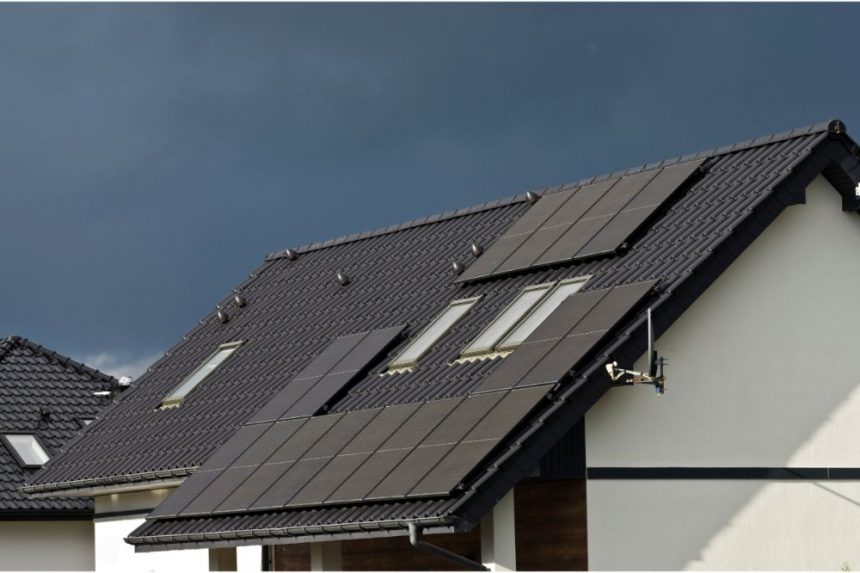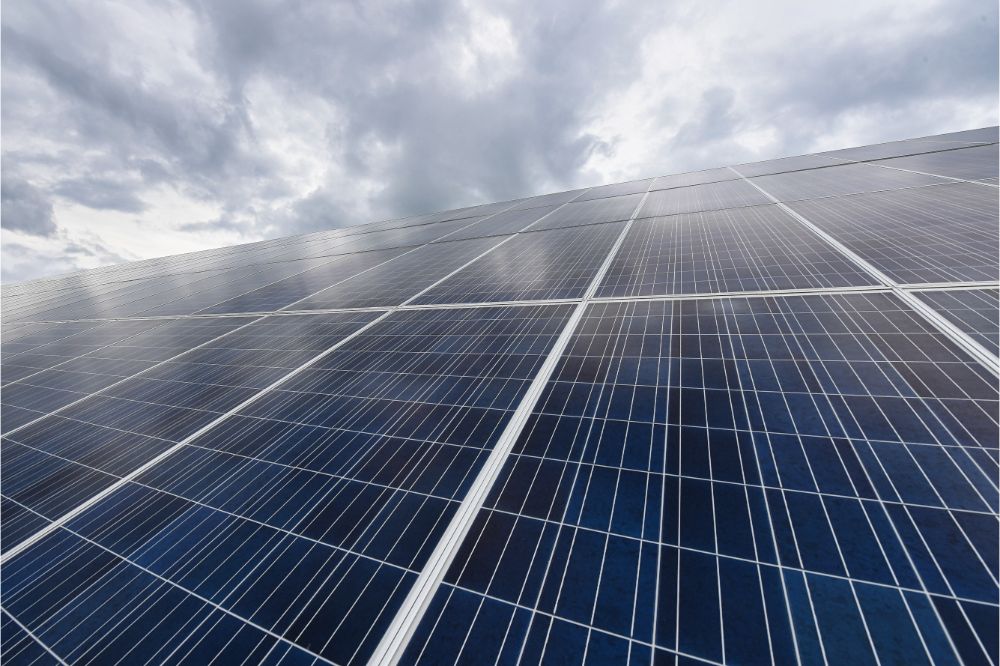The weather always changes, which begs the question, “Do solar panels work on cloudy days?“
As devices that rely on the sun’s energy to produce electricity, it can be easy to assume solar panels don’t work with less sun.
Surprisingly, many solar installations can still work with indirect sunlight.
Today, let’s explore what cloudy weather means to your electric grid and how it affects the energy output of your panels.
How Do Solar Panels Work?
Understanding how solar panels work is the first step to deciding whether they’re the right energy source for you.
As their name suggests, these solar systems rely on the sun’s power to absorb energy you can use to power your home or campsite.
In more technical terms, solar panels absorb light and transform it into DC power.
The DC power then runs through a solar power controller and transforms the energy into AC power.
AC power is the type of energy that your refrigerator, cooling system, and even lights rely on.
This converted power is sent directly to your appliances as needed, offering an endless line of green energy to put to good use.
What makes solar systems even more unique is they can continue converting and storing energy outside of what you use.
Many systems have solar cells that can store excess energy in batteries.
At night, your power system will use the excess power in its reserves, as there’s no longer sunlight to be absorbed.
Do Solar Panels Work on Cloudy Days?
Undoubtedly, solar panels work best when they have access to direct sunlight.
However, solar radiation is still present even if the sky is overcast and cloudy.
A perfect example is if you’ve ever been to the beach and still gotten burnt, even in cloudy conditions.
That said, your panels have the option to absorb solar energy, even in cloudy conditions.
Solar cells might not absorb as much solar energy as they would in direct sunlight, but they can still work well.
This is particularly true if you invest in high-quality panels with optimized energy production.
The more efficient your panels are at energy production, the more solar radiation they’ll absorb during the day.
This should give you more than enough power to offer a direct current to your appliances while adding excess energy to your solar batteries.
That said, monitoring your solar power system to determine its effectiveness in a cloudy climate is important.
Many people find their panels produce 25% of their standard power output while others might have less.
Setting up metering policies for your system can be a fantastic way to know how much power you’ll have available with cloudier conditions.

Cloudy Locales Known for Solar Panels
You might be surprised when you look at the top cities known for solar panel installation.
Many locations with a high density of cloud coverage top the list for the most installed solar cells per household.
According to the Shining Cities 2022 survey, the following cities are some of the “Solar Superstars,” producing the most solar power per person:
- New Orleans, LA
- Denver, CO
- Indianapolis, IN
- Newark, NJ
- Hartford, CT
Undoubtedly, each of these cities is known to have inclement weather from time to time, ranging from hurricanes to heavy snowfall.
Even with these weather issues in mind, they’re still topping the list for producing the most solar energy per person in the United States.
It’s easy to see how this source of green energy can continue being useful, even with heavy cloud thickness, rain, and inclement conditions.
What Other Weather Conditions Affect Solar Panels?
Interestingly, direct sunlight isn’t the major factor that can affect solar production.
Let’s look at a few weather conditions that can affect your access to renewable energy.
Heat
Did you know heat can have a massive effect on solar energy generation, even though panels work best in direct sunlight?
A rule of thumb with solar panel efficiency is that the hotter the panels, the less voltage they will produce.
This principle is similar to any other electronic device; the hotter they get, the less efficient they become.
An excellent way to know how heat affects your specific solar panel output is to look at the owner’s manual for your panels.
Some manufacturers recommend 77 degrees Fahrenheit as the optimal temperature for high-efficiency panels.
Others suggest that anything under 77 degrees Fahrenheit can be helpful for their solar panel systems.
Rain
The rain itself won’t have much of an effect on conventional panels, as long as they have weather and waterproofing.
However, the clouds that come with rain could lower your solar power output for several hours.
The darker and heavier the clouds, the less solar system power output you’ll experience.
That said, rain can also be helpful for your solar panel setup.
A little bit of water now and then can be a fantastic way to clean the individual cells, helping them absorb more sunlight on sunny days.
There will be less debris that could block the transmission of radiation to the cells.
Snow
Of course, snow can be a significant issue for any solar panel installer.
Unlike cloud cover, snow is often thick and dense, preventing light transmission.
Removing massive amounts of snow from your panels is always best to ensure they’re working at their best.
Fortunately, in most instances when it’s snowing, there might also be ample sunlight.
In these instances, the snow will immediately melt off your panels, allowing your system to continue producing excess electricity.
Shade
Shade can be classified relatively the same as cloudier conditions. Like considerable cloud cover, shade on summer days can affect how much energy your solar panels produce.
Although it won’t make them entirely useless, it can limit the renewable and sustainable energy your system captures.
Wind
The wind is one of the best weather conditions to hope for if you need additional solar savings.
As long as your panels are installed correctly and unlikely to fly away, you can experience several benefits.
First, the wind is a fantastic way to clean the surface of your solar panels, boosting their efficiency.
Second, the wind is one of the most efficient ways for solar panels to cool down on the hottest summer days.
As the wind blows over the solar cells, it helps to manage their temperature to work more efficiently.
It is one of the main reasons why solar panels can work well in high-heat, high-wind locations.
The wind is also a fantastic partner to help moderate humidity surrounding your panels.
Humidity can cause water to accumulate on the panel surface, reflecting sunlight away from the panels.
If you live in a particularly humid environment, excess wind can keep your panels dry to avoid energy loss.
Do Solar Panels Work at Night?
Knowing that solar panels work in partial shading and cloudy conditions might make you wonder whether they’re useful during nighttime.
Unfortunately, solar panels do not work at night, regardless of how efficient your panels are.
It’s important to remember that the sun completely sets at night, and there’s zero solar radiation for your panels to absorb.
Without sunlight, your panels cannot optimize your battery storage or directly power your appliances, even low-power appliances.
However, just because it’s nighttime doesn’t mean your solar power system is useless.
There are two main ways households can continue using their solar power at night: metering programs and solar battery storage.
Metering Programs
Not every solar panel installation comes with batteries for excess electricity.
In these instances, looking into metering programs, also known as net metering, can be helpful.
Instead of putting the panels’ surplus power into a battery, the energy is put into a grid managed by utility companies.
At the end of every month, households will receive credits from the utility provider for their electricity bills.
This is a helpful tool to offset energy consumption costs, helping to save people money.
For most households, net metering allows them to cancel out their utility bills altogether, making solar energy a fantastic deal.
Solar Battery Storage
The other option to help save homeowners money is installing solar battery storage with their solar panels.
As your system produces excess electricity, it is stored on an on-site battery rather than being put back into a utility grid.
It’s the simplest option, especially if you’re a first-time solar installer.
At night, while the sun is asleep, your system will convert to using its battery reserves.
When the sun rises, your solar system will take the time to recharge while also powering the rest of the appliances in your home.
This solution is a fantastic option for solar customers living off-grid and independent of utility companies.
Solar Panels and Cloudy Days
So, do solar panels work on cloudy days? Yes, they can.
Solar panels are a great option to lower your cost of electricity while also ensuring you have continual access to electricity.
They are bound to work best in sunny and dry conditions with moderate temperatures, helping maintain an even flow of electricity.
Although these panels can work in dense clouds, no cloud cover is highly recommended for top energy production.

